Japanese people are incredibly warm and welcoming towards tourists visiting Japan. However, travellers, especially those coming from the West, tend to worry about unintentionally insulting the Japanese. During my time living in Japan, I hosted many friends and family who asked a lot about the dos and don’ts in Japan, what cultural etiquette should tourists know about and how can I try to fit in more during my time in Japan.
Well, I’m here to tell you that it’s completely normal to be conscious of cultural etiquette in Japan – in fact, it’s quite considerate of you. At the same time, there really is no need to worry as the Japanese really don’t expect you to know all of their cultural traditions.
The most important thing to know is that as long as you act kind and you are respectful, then you’ll be absolutely fine! I lived in Tokyo for many years and made several etiquette mistakes (some that are far too embarrassing to share!) and that’s okay.
With all that being said, if you make a little effort during your time in Japan, it will make a world of difference. Japanese people are incredibly appreciative when tourists make the effort to be culturally aware.
In this post, you’ll find lots of tips on Japanese cultural etiquette and some crucial do’s and don’ts in Japan which I hope will help you to get even more out of your trip.
Disclaimer: This post may contain affiliate links. If you purchase through my link, I may receive a small commission at no additional cost to you.
Like this post? Then please pin to share!

Table of Contents
Do Stay Quiet On Public Transportation
While taking public transportation in Japan, it is important to know a couple of things. Talking loudly to friends on the train, chatting on the phone and blasting music through headphones are all very much frowned upon in Japan.
On the subway, mobile phone use is very discreet and you’ll notice quite quickly how quiet the subway carriages are. Japanese people tend to use public transportation as a place to nap, relax after a hard day’s work or play games in silent mode.
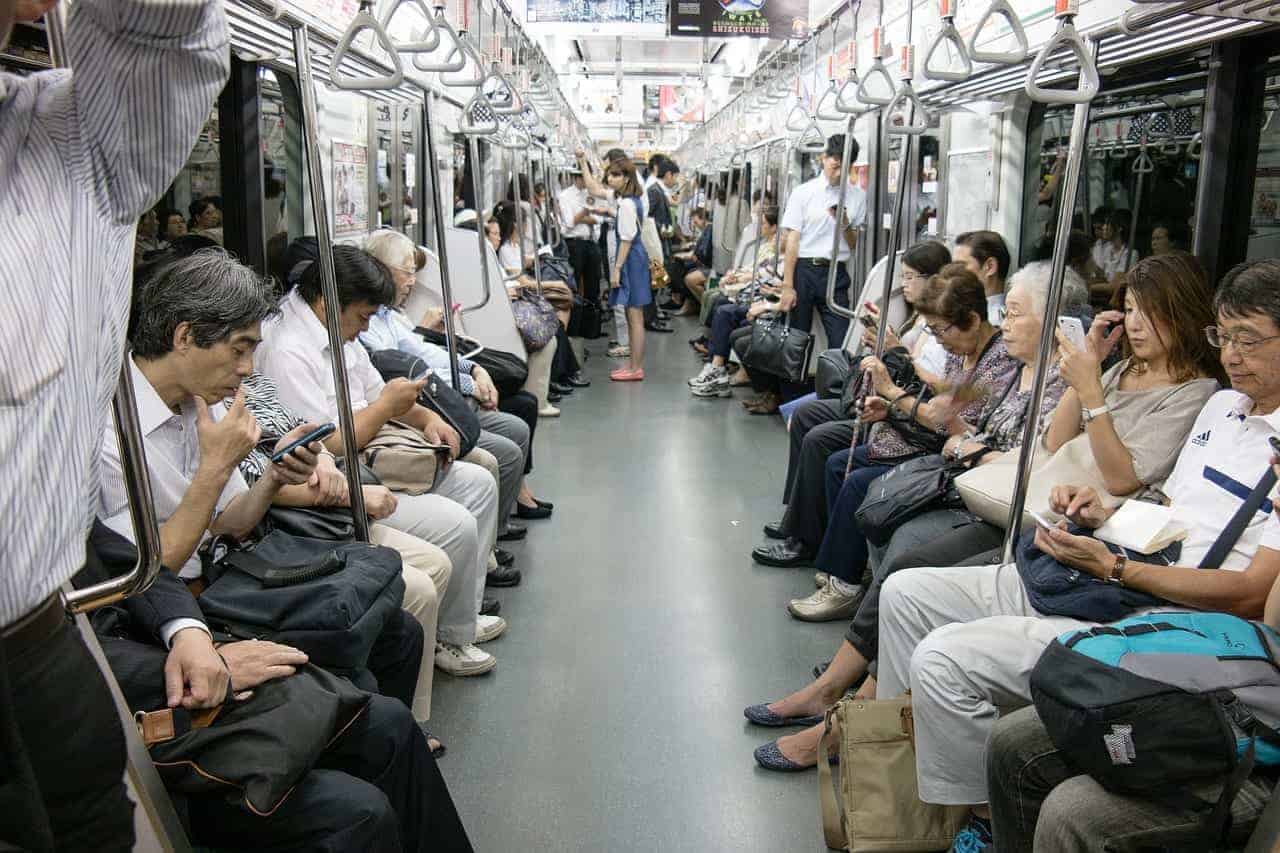
While mentioning the subway, it’s important to know that there are designated female-only carts on certain lines due to groping incidents which have occurred on packed trains. If you are a solo female traveller, this is definitely something to be aware of. The female-only carts are usually at the end of the train and there is a bright pink sign to help identify them.
Don’t Leave A Tip In Japan
Unlike many other countries around the world, tipping is simply not the done thing in Japan. It’s not rude as such but it is definitely not expected. And don’t be surprised if you find a waiter/waitress chasing after you if you do leave money on the table.
It’s completely normal to feel uncomfortable with this concept if you come from a country where tipping is prevalent. Simply try to keep in mind that it is just not expected and trying to tip will only lead to confusion.
However, there is one exception – if you take a tour during your time in Japan, it is always acceptable (but again not expected) to give your tour guide a small tip. Make sure to wrap and fold the tip in paper and politely hand it to your guide using both hands.
Be Aware Of Japanese Chopstick Rules
Firstly, it is not expected of you to be able to use chopsticks as a tourist in Japan but the Japanese will be super impressed if you do. Most restaurants will have forks on hand if you need one.
What is important though, whether you are a master chopstick user or not, is to be aware of some of the important chopstick ohashi rules:
- Don’t rub your chopsticks together – this may imply to the restaurant that you’re dining in that you don’t think that they provide quality chopsticks.
- Don’t stick your chopsticks vertically into a bowl of rice, this is known as tsukitate-bashi, a ritual performed at funerals only.
- Don’t point your chopsticks at another person or spear your food with them.
- Don’t pass food to someone else’s chopsticks directly – take the food (with permission) from their plate to and place it directly on to your plate before eating it.
- Keep your chopsticks in a parallel position when not in use and not crossed in any way.
- When eating from a communal dish, use the opposite end of your chopsticks to serve yourself.
I know that this may seem like a lot to remember but showing Japanese people that you are trying to be respectful is the main objective. Again, they would never expect you to know and follow all of these rules.
Don’t Eat Food on the go in Japan
In Japan, you really won’t see people eat or drink on the go. Yes, there are on average 5.5 million vending machines in Japan which would make you think otherwise. However, people tend to eat/drink immediately near the machines and toss the empties into the bin next to it.
Rubbish bins are ridiculously hard to come across in Japan. And yet, the country is sparkling clean so there has to be some logic to it.
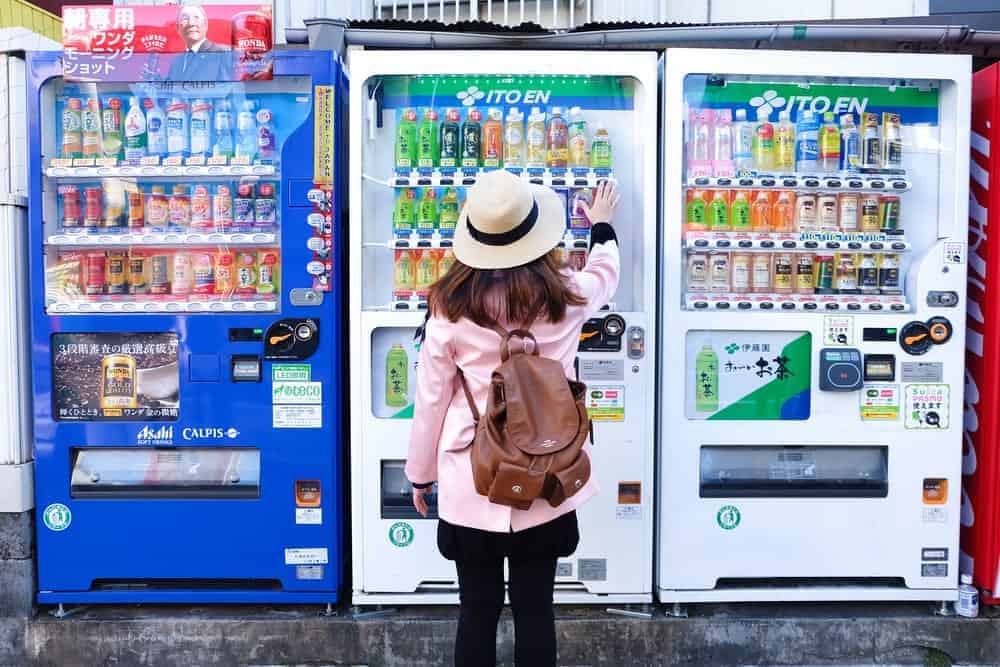
Similarly, eating or drinking on public transport is considered bad manners unless you’re travelling a long distance on the Shinkansen. I learned this the hard way when during my first few weeks in Tokyo, I got on a train eating an ice-pop (the humidity level was off the charts and I was looking for any way to cool down!) and low and behold it melted all over me and the seat next to me. The ice-pop was bright blue and I was bright red. Not a good combination – the Japanese are far too polite to say anything but I still cringe to this day when thinking about it!
Do Follow the Escalator Rules
If you come from another hugely populated city such as London or New York, then you may already be familiar with this etiquette rule. Riding the escalator in Japan has all sorts of little rules attached to it and you will see people conform to them everywhere from the subway stations to supermarkets.
The left side of the escalator is for standing and the right is for continuous walking. If you decide on the quicker right-hand side, make sure you don’t leave anyone waiting behind you trying to get past.
Japanese people are far too polite to say anything so you could end up with a trail of people behind you hoping that you’ll get out of the way.
Don’t Be Afraid Of Japanese Toilets
I couldn’t not mention Japanese toilets, could I?! By now, everyone has heard the hype surrounding the magical toilets of Japan and how they can do everything and anything as you go about your business. Ahem.
I had one in my apartment in Tokyo and I miss it dearly although it took quite a while to figure out what all of the buttons meant. Some things to note are that you can warm the seat, there’s usually an integrated bidet, you can play music to cover up ‘certain sounds’ and they are incredibly hygienic.
However, also be aware that Asian squat toilets are still in existence in Japan. While mostly found in rural cities, you will still find them as an option in train stations and some restaurants and hotels.
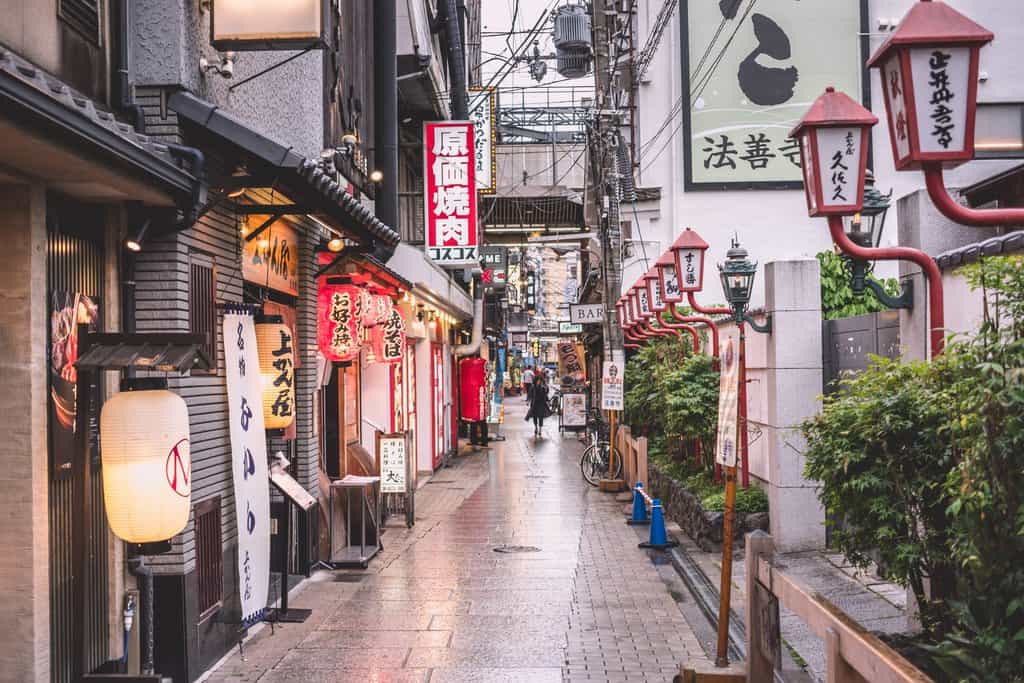
Do Know How Taxis Operate
While I highly recommend using public transportation all throughout your time in Japan, it’s inevitable that you’ll need to use a taxi at some point. Japan is well renowned for being a technologically advanced country and this definitely extends to taxis.
When you hail a taxi, unless there is a group of you, you should sit in the back. The door will automatically open for you and once you’re comfortably inside, the taxi driver will politely close the door behind you.
The inside of Japanese taxis is a sight to behold; spotlessly clean, linen doilies on the seat, a money tray and an oasis of calm. The taxi driver most likely won’t speak any English so knowing a few Japanese phrases will definitely help.
Do Take Off Your Shoes Indoors
Tourists visiting Japan need to be aware that wearing shoes inside certain places is something you should never do in Japan. Wearing outdoor shoes is deemed unhygienic by the Japanese so you will be expected to remove your shoes immediately when entering a Japanese home, schools, hospitals and certain restaurants and temples.
Don’t worry though, slippers are always provided. When you enter a building and you see a line of shoes at the entrance, then you know that you will be expected to remove your own.
For tourists, you will most likely notice this at a traditional ryokan, at Japanese restaurants and of course inside shrines and temples. Also, another important rule to note is that you will be expected to exchange your slippers for ‘toilet slippers’ if you visit the loo. You’ll see them at the bathroom door so you can’t miss them – don’t forget to change back when you’re finished though!
Pro-Tip: Many restaurants will often provide lockers where you can store your shoes and I definitely encourage wearing easy on-easy off shoes to hurry up the process.
Personally, I love this whole concept. It’s hygienic, comfortable and something you quickly get used to. In fact, even though I’m no longer living in Japan, it is something I still do.
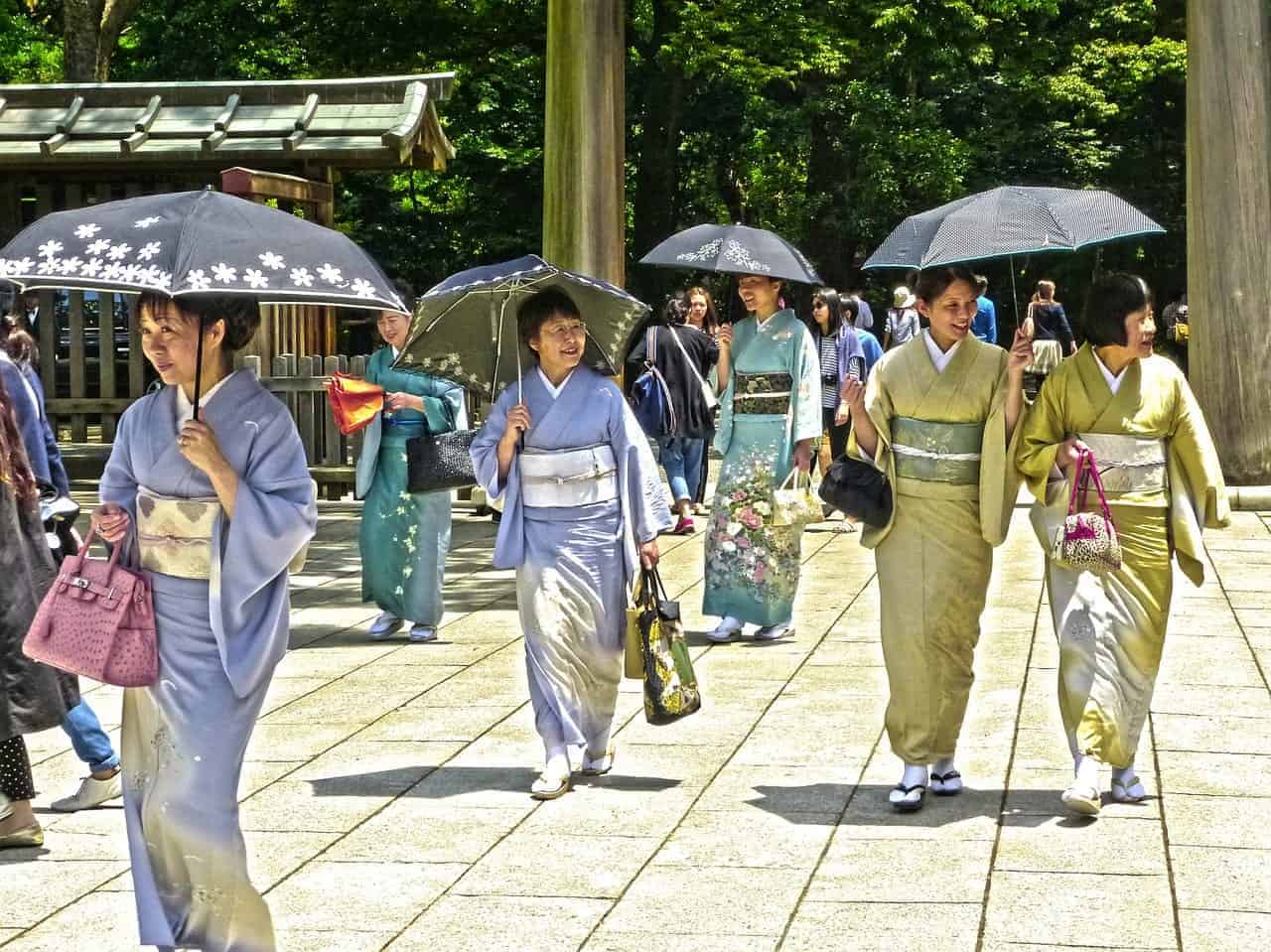
Don’t Ever Skip The Queue
The Japanese will always line up in single file whether it’s for the train, bus or the latest popcorn shop (yes, seriously!). To be honest, I’m not sure if they love it or hate it but queuing up is the done thing, skipping the line is not.
The best example of orderly lining up I have ever seen is in Omotesando, Tokyo. Omotesando is a designer haven but it is also the most popular area for new brands/shops to open. I’ve seen queues go a mile long for things like crepes, socks and flavoured popcorn.
Tourists should also know that you should never barge your way onto trains in Japan. You simply wait for people to get off completely and then get on when it’s your turn. Do expect to be squashed if it’s rush hour though and make sure that all of your limbs get on with you. I saw far too many arms and legs getting trapped indoors for my liking!
Don’t Blow your nose in public
Tourists travelling to Japan need to know that you should never blow your nose in public. It is rude and unhygienic to Japanese people.
So what should you do if you feel the urge to blow your nose? Sniff or snort until you can excuse yourself to blow your nose in private. You will often hear lots of stuffy-nosed people sniffing continuously on trains, waiting patiently to give their nose a good blow at home.
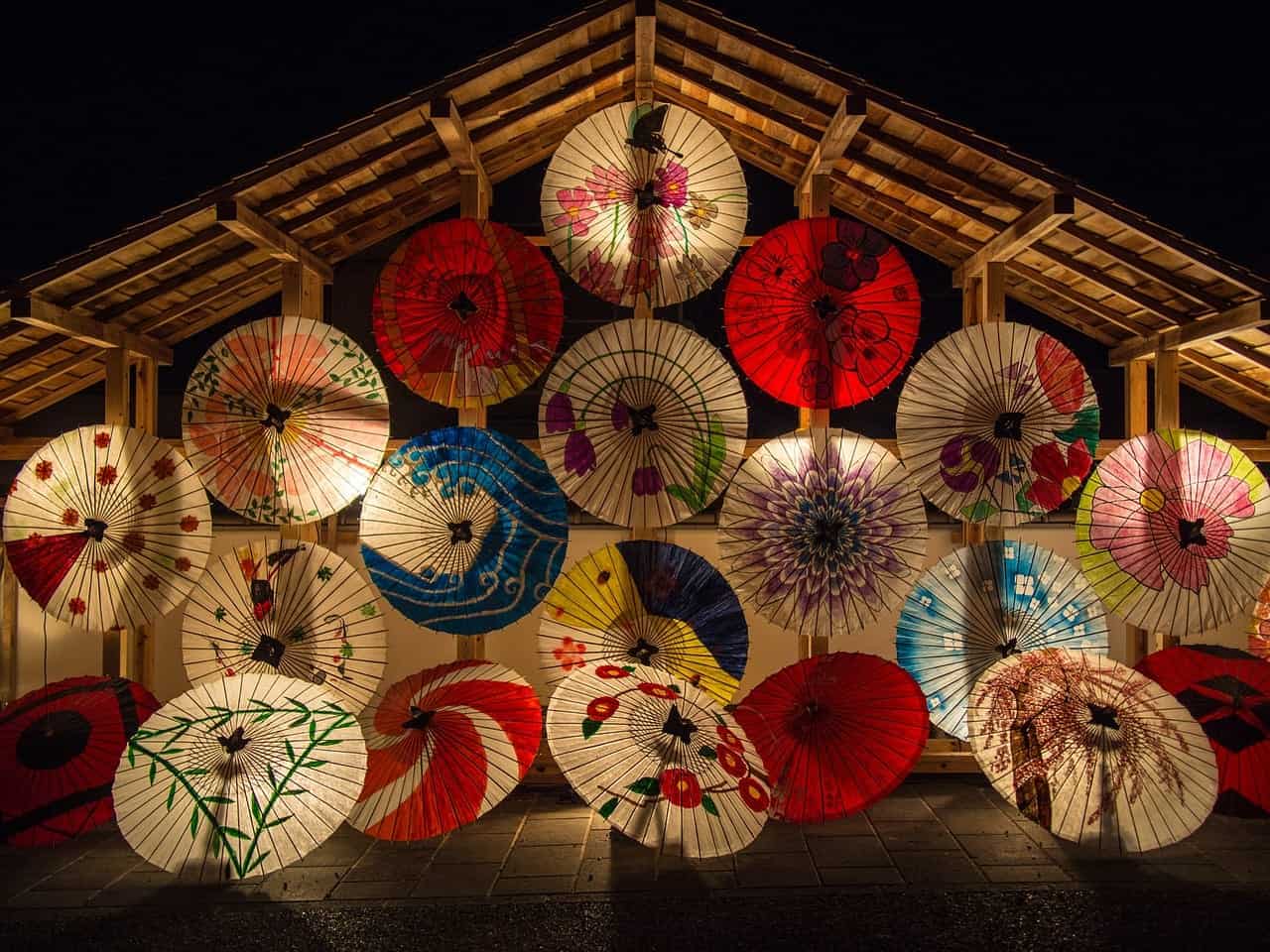
Don’t expect everyone to speak English
No matter where you travel to, it’s always a good idea to learn a few of the local phrases, right? Plus, it’s also a sign of respect and it can be really useful too.
This is especially true of Japan. Japanese people do learn English in school and there is a huge emphasis on learning English now in the run-up to the 2020 Tokyo Olympics. However, put yourself in their shoes – wouldn’t you appreciate it if someone tried to speak to you in your native tongue?
In most of the big cities in Japan, you will find people who can and will speak English but if you plan on travelling into more remote areas, this is less likely.
Some Japanese friends also told me that they are sometimes shy or nervous to communicate in English for fear making a mistake. A few simple phrases certainly go a long way and expect to hear shouts of ‘Irrashaimase’ (welcome) everywhere!
Do Hold Back on Public Affection
PDA otherwise known as public displays of affection are rarely seen among Japanese people. You might see some hand-holding but that’s about it. It is seen as very much a private thing so tourists should never get smoochy publicly in Japan unless you don’t mind an audience of shocked onlookers!
Do bring Some Japanese yen
For such a technologically advanced nation, Japan is still very much a cash-based society. Larger hotels and restaurants will, of course, accept credit cards but I highly recommend having Japanese yen on you at all times.
In fact, up until a few years ago having a credit or debit card was almost unheard of in Japan. I had to open two bank accounts when living there – one had great rates and the other provided a debit card. The local conbini (convenience store) handles pretty much all online payments and you then pay in cash.
Keep in mind too that not all ATM’s in Japan accept foreign bank cards. The ATM machines in Lawson or 7/11 are your best bet but some stop withdrawing cash at 9pm and they often charge ridiculous fees.
Do Know How To Pass Money When Paying
On the subject of money, I’ve already highlighted that it’s likely you will need to pay in cash during your time in Japan. But what you also need to know is that paying in cash is also done in a uniquely Japanese way.
Cash in Japan is very rarely passed from hand to hand which you may be used to doing in your own country. Instead, cash in placed on a small tray and any change due is placed on the tray after too. These money trays are found in restaurants, conbini’s (Lawson, 7/11 etc.), taxis, hotels and banks.
Don’t Worry About Onsen Etiquette
Onsen (Japanese hot springs) bathing is a very important part of Japanese culture and they are widely visited by tourists and Japanese alike! There are certain well-established onsen rules though and there are certain things that tourists should never do when visiting one in Japan.
The main rules you need to be aware of are that you must rinse off thoroughly before entering the hot spring, you need to bare all (literally), don’t take photos and always check the tattoo policy of an onsen.
The tattoo rule is somewhat discriminatory but for Japanese people, tattoo’s are associated with criminal gangs or ‘yakuza‘. Bathing spaces are separated by gender and you can cover up with a towel before getting in.
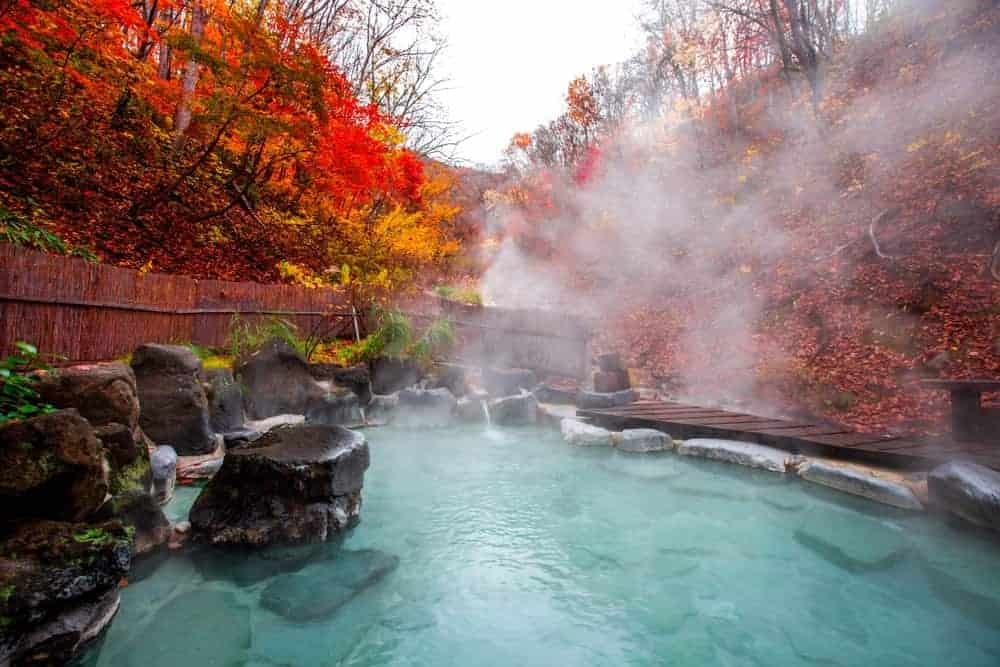
You Might Also Like….
- Where To Stay In Japan – The Ultimate Guide
- The Most Incredible Day Trips You Can Take From Tokyo
- How To Watch Sumo Wrestling in Japan
- Themed Cafes You Need To Visit In Tokyo
- The Ultimate Tokyo Bucketlist
Like this post? Then please pin to share!
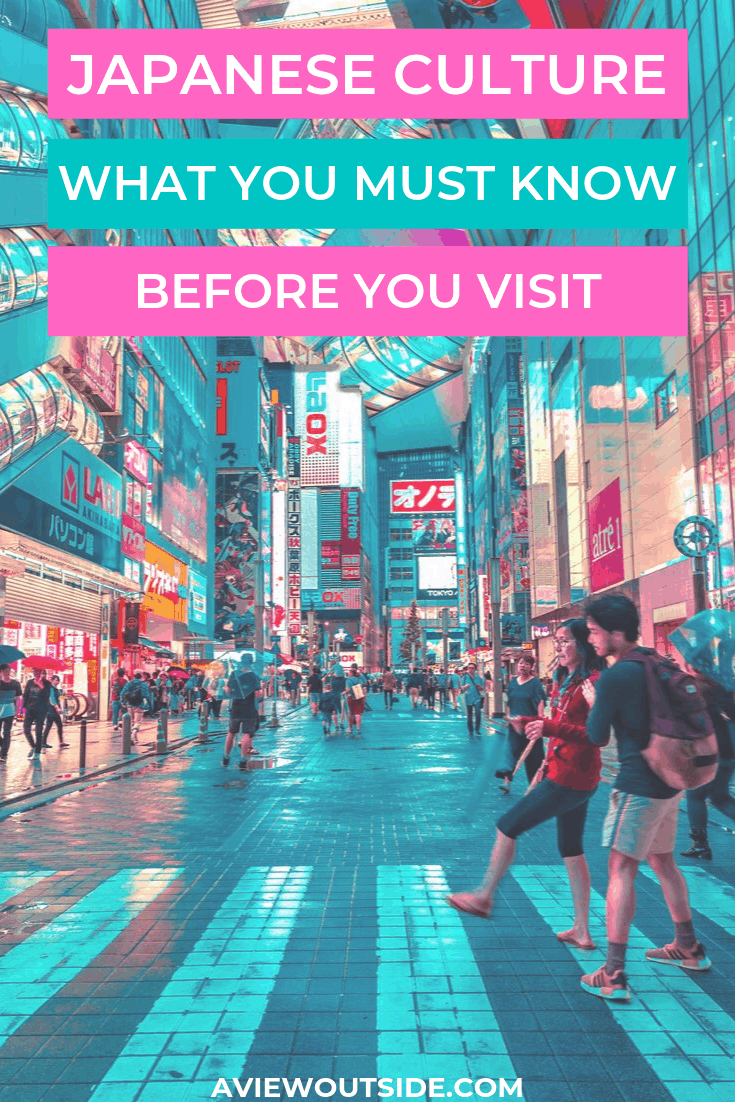
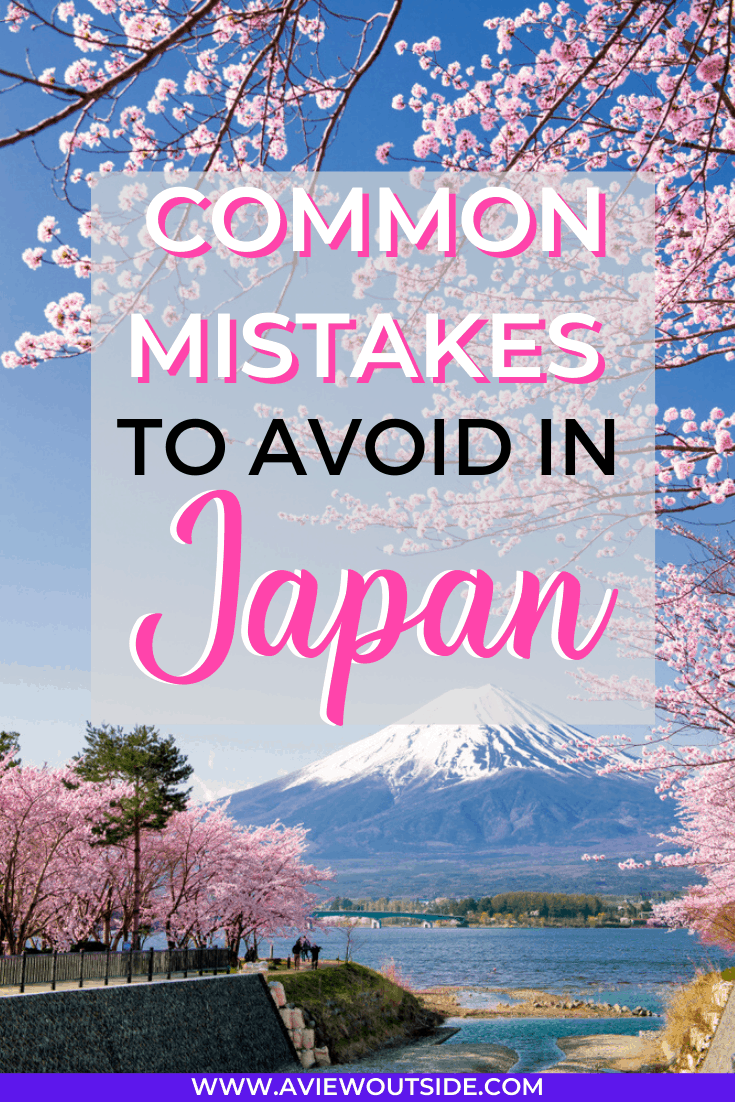
Have you been to Japan? Do you have any other tips on cultural etiquette in Japan? I’d love to hear about it in the comments!


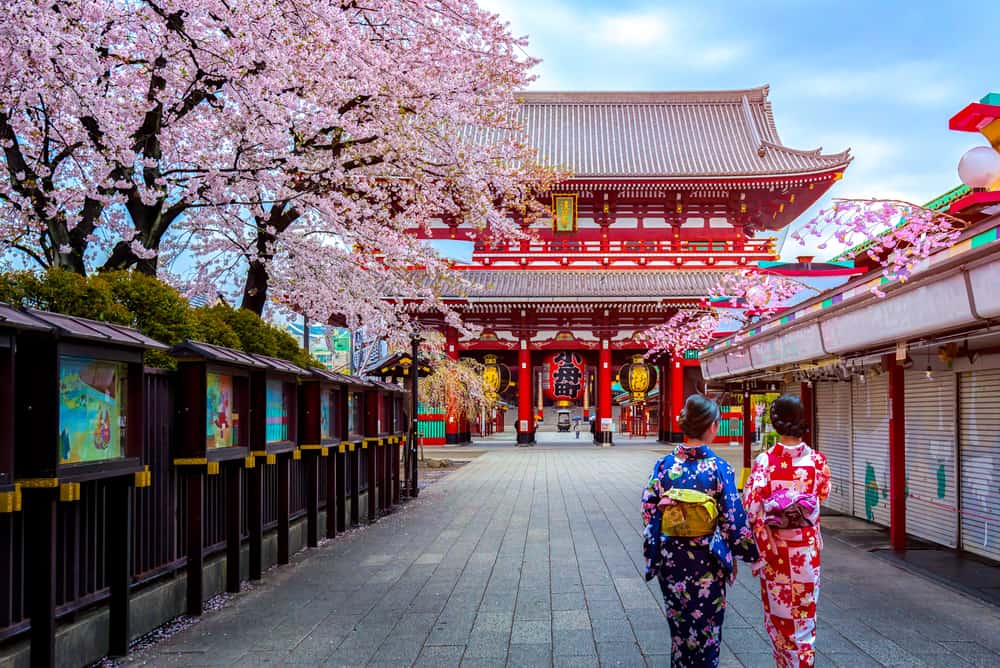












63 Comments
Loved this Ciara..the chopstick rule is so interesting!!
Zee
Thanks Zee – yeah I got a few stares until I found out about the chopsticks oops!
Wow! A fascinating post! I didn’t know most of that (beyond “don’t be loud”). Your post makes me want to visit Japan!
Thanks Lisa – visit Japan! You wont regret it x
This is so interesting! I used to live in China and definitely see some similarities! I’ll keep this in mind if I ever visit Japan in the future!
Thanks for the comment Cynthia! Yeah I definitely think there might be a few similarities alright. I need to go to China!
Wow, I’ve fallen in love with Japan already! Especially love #2; good to know the workers are paid well! Really great tips! Can’t wait to visit.
Thanks so much Tay – Japan is such an amazing place!
This was super interesting and really good tips! It’s always good to familiarize oneself with the culture, if the culture in your destination largely differs from your own, to avoid insulting anyone or embarrassing oneself. And Japan is probably one of the “strictest” (in want of a better word) cultures. x
Teresa Maria | Outlandish Blog
Thanks Teresa for the comment! Yeah it really is so important to know about the culture especially if it’s different to your own, such a good point!
The look of death when you’re loud on public transportation is serious! Taiwan is similar.
S .x https://samsramblings91.blogspot.com/2019/04/tips-for-long-flights.html
Oh really? I haven’t been to Taiwan (yet!) so that’s definitely good to know!
Ahh good old Japan, I experienced all of this when visiting last September! I loved how polite and friendly the locals were. I think another one is not to wear clothes in an onsen, this stopped me going to one as I was being too much of a chicken and instead had a private onsen with my boyfriend for an hour to experience it in private! Melis x
I’d love to hear more about your trip Melis! Yeah the onsen rules are quite strict! Did you know if you’ve visible tattoos they probably won’t let you in either?! I love onsens once i’m in though ha!
Thanks for the educational read! I will have to keep these in mind if and when we end up in Tokyo. I didn’t realise they love a queue even more than the English do!
Haha thanks Rachael! They really do love a queue – i’d never have the patience!
This is a great post and I am so glad I came across it! My daughter, husband and I will be spending a few days in Japan within this next month! We are going to South Korea to visit my son and will go over to Japan while we are there! Thanks for sharing!
Oh wow, that’s amazing Julie – you’re going to have an amazing time! I lived in S. Korea for a year, it’s an amazing country too! Where in Japan are you planning on visiting? So exciting!
I LOVE this I haven’t been to Japan but I would like to some day. Who would have known that holding your chopsticks a certain way could be disrespectful. Also about leaving a tip that’s so interesting thank you this was a very informative but fun read!
I know – the chopstick rules are a little scary and actually a lot of Northern Asia has specific rules about them. Thanks for reading and commenting!
OMG this is the best – so many articles about what to see and what to do but the information you provided here is equally if not more valuable to a successful and smooth trip to Japan! Thanks!
Awh thanks Maggie – i’m glad you liked my post! Do you plan on visiting Japan?
There were some new ones here for me! I love Japan and would love to go back some day, it is just such a looooong flight! Thanks for sharing this great article!
I’d love to go back some day too – hoping to visit later this year! Yep it certainly is a long flight. Thanks for the comment Maria!
I really like this post! These are so interesting! Thank you for sharing!
Thanks so much Tamra!
Terrific list! I visited Japan years ago and as I read your post I found myself wondering if I mistakenly committed any of those mistakes. I knew about the shoes, but I’m not sure if I was sensitive enough to notice all of the others. Thanks for the useful list!
Thanks Lisa -some of the cultural nuances are hard to spot! Japanese people are so polite and friendly that they would never say anything. I loved learning about the culture when living there, it’s so different to my own!
I have traveled to Japan last month and it’s an amazing place, I was loving Japanese food. Tokyo is quite similar to NYC.
Oh wow – i’m glad you loved Japan, Julia! Yeah there are similarities. I’ve only visited New York a couple of times and loved it there too!
This is so interesting and definitely a few things I hadn’t heard before – really shocked to hear about the cash in particular!! Thanks for the info, I’d definitely love to visit one day 🙂
http://www.itsgemmaedwards.com
Thanks for the comment Gemma – yeah a lot of people are surprised about the cash thing. I hope you get to visit one day, it’s an amazing country!
This is such an incredible list. When I travel, I want to truly experience the culture. This definitely involves taking the time to do some research and learn about the country you’re travelling to as there are so many different nuances and culturally accepted activities from place to place. I’ll be saving this one to refer back to!
Thanks so much for the comment Britt – I guess after living in Japan for a few years I picked up a lot. You’re right, plus isn’t it cool to learn about different cultures and traditions?
I really want to go to Japan one day, so knowing these things will be vital for when I do go. It’s always interesting to hear about what you should or shouldn’t do in certain countries, especially when some are so different than what we are used to.
Thanks Sarah – yeah Japan is definitely unique. I agree – it is so important to learn about other cultures and what you should and shouldn’t do. Thanks for the comment!
This is awesome, that female-only carts especially surprised me! I can’t wait to visit Japan- I’ll be bookmarking this for the future.
Thanks Nikole – yeah the groping thing is a bit of an issue but the women only carts work well. Terrible that it’s needed though!
These are such interesting facts, I think I’m finding it more interesting because l absolutely love Japan?! Thank you so this post
I love Japan too, thanks for your comment!
There are amazing and helpful tips! Every culture is different, and it’s so important to read up before traveling so you don’t accidentally offend someone! Thanks for sharing!
Thanks for your comment Ariana, yeah I think it’s so important too to know about other cultures. Especially in Japan where it is so different!
South Korea has many of these as well! PDA is most notably the difference, but I guess that also depends on the perspective? All these blog posts always say that PDA is a big no no in Korea, but you always see them pretty much all over each other even in public transportation, as if to show off to others just how ~in love they are. Which to me is a lot more PDA than what I see back at home, but then I guess the difference is that in Finland you may see people kiss each other in public while you wouldn’t in Korea. Is it similar in Japan or do they really just not do PDA apart from hand holding?
– Laura // afinnontheloose.com
Great tips! My husband was in Japan for the first time about a month ago but I’ve never been yet. Will definitely remember these when I travel there!
-Hillary
http://www.shmillas.com
Omg sooo darn useful! Japan is on the list next year so this has been saved carefully! Thank you so mucccch!?❤
I was in Japan in February and noticed most of these! When we bought a snack in one of the stalls they did tell us to stand on the side to eat it instead of walking with it. People were very organised with queues too! x
G
https://www.teawithgi.com
It always made me laugh when tourists would block the escalators in Japan (and in London too), people would get so frustrated! It’s really good that you’ve listed these tips, because it’s really important to read up about things like this before going away.
I would love to visit Japan one day! It seems so beautiful. I loved hearing about all the Japanese traditions and etiquette. What a great read!
Thanks for your comment and glad you liked the post. Japan is simply amazing, I hope you get to visit one day!
Love this – I am so fascinated by Japan and their culture this is such an interesting read! I’ve pinned it for when I go ??
Thanks so much for your comment! You’re going to love your time in Japan!
So interesting! I love learning about culture from different Asian countries because they’re all so different from each other and especially from the US. Thank you for sharing (:
Going to Japan this March! These are such good tips to know!
Thank you so much – comments like this mean the world!
I’m so glad I’ve read this now as we’re going in March and I wouldn’t have had a clue with some of these! Some of them are similar to the UK (the escalator rule and letting people off the train first) but there are a couple of things I wouldn’t have thought of. 🙂
Honestly all of these make so much sense and I wish they were common at home here in the States. When I would commute to and from work in NYC on the subway, some of the behavior was so freaking annoying. I wish it was more expected to queue, and let others off before you get on, and definitely to not talk on the phone or play music out loud. Some people really don’t care about the people around them. A female-only train car is such a good idea too. The escalator thing is supposed to be followed in a lot of places I think, but for some reason people still don’t do it. A little odd about not eating while on-the-go, although it’s probably better that way; rushing through meals isn’t very mindful. The blowing your nose and PDA rules should be worldwide too lol, that always grosses me out. Japan has this etiquette thing down!
I lived in Japan for a few years, and I totally agree with all of these. Although to be fair, if you get anything wrong, people will just assume you’re a dappy foreigner who doesn’t know any better!
Once I went on a hiking trip with a bunch of Kachos from the prefectural government. They all got drunk at an onsen and were rowdy/singing on the train back to Nara. I remember being shocked as I’d never heard so much noise on a train – I guess the exception proves the rule eh!?
Hoping to go to Japan this year so found this guide really interesting and useful! Especially the subway and eating in public etiquette!
I wish you had written this 20 years ago when I first went to Japan. I found it very scary because I didn’t know any of this stuff.
Oh nice! This will be useful for when I finally make it to Japan. bookmarked!
All of these tips are amazing! I didn’t know that you couldn’t eat-on-the-go or tip in Japan 🙂 I’ve never been to Asia but would like to change that this or next year.
Japan is on my list, and I had no clue that you couldn’t do some of these things! Thank you so much. I will keep this in mind when I do head to Japan.
This is such a helpful list!! I’ve been to Japan several times but I’m ashamed to say that I didn’t know quite a few of the Dos and Donts including chopstick etiquette!